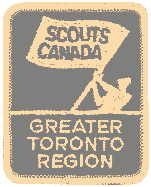
www.gtrsi.com
 |
www.gtrsi.com |
 |
Sharing and cooperation.
These words epitomize the Beaver program. So, do Beavers ever fight? You bet they do! Rivalry between Beavers within a lodge or tail group is a normal occurrence. Perhaps one child feels another gets more attention, more craft material, or more chances in a game. Beavers can be inseparable friends most of the time and then, within minutes, face each other like spitting cats.
To help you keep peace between Beavers and maintain your own sanity, try these tips for handling youthful rivalry.
Avoid becoming judge and jury right away. Help the children to clam down and work through their own problem by talking out their concerns. Use a simple problem solving method. Let the Beavers decide what their problem is, what alternatives exist, which is the best one, and how to implement an agreed-on solution. This method will help them greatly in the future.
Set realistic expectations. When working with mixed ages it's tempting to gear a program to either the youngest or oldest child. DOn't expect Blue Tail Beavers to read lengthy instructions; they might not be able to do it. White Tail Beavers should be able to fully act their seven year age. Don't expect more from them.
Allow Beavers to share feelings openly. Give them permission to feel hostility toward other Beavers. Denying Beavers their feelings of anger only drives it underground. This can breed resentment and revenge. Let Beavers know it really can be difficult living with people who think or act differently than we do.
At times, real anger |
Let your Scouting children know how similar your childhood experiences were to theirs; share your feelings with them. At times, real anger can make a child very frightened, so let eavers know that you have sometimes been there too.
If you're taking your colony on a field trip, think of situations that may cause problems. Long waits, eagerness to see one exhibit and not another, staying with (or straying from) the group, not wanting to be someone's partner: if you come prepared to deal with these issues, you can diffuse them more easily.
Another potential disaster looms when leaders provide materials in assorted colours. A child who wants something green inevitably loses out because everyone else picks that colour first. To avoid disappointments, if possible, give children all the same items or choices.
It's easy to be sucked into the turmoil and tension if you stand between two fighting children. When youth get worked up over even the smallest issues, they find it difficult to regain composure and control. They look for an adult to help restore order so the Beavers can calmly sort out their problem. Getting involved in the fight and losing your temper tends to escalate a situation.
Plan "A" may work for a situation one day, and Plan "B" may prove more effective for the same situation another time. Work with Beavers to find out what they would do to resolve their concerns.
Sometimes leaders turn into referees on short notice. By setting the right tone, you've won half the battle. Sharing and cooperation: that's what it's all about.
"Reproduced with permission of the Leader magazine
and the author."
|
Disclaimer: Anything posted to this Home Page
are the opinions of the individuals who posted them and are not the views of Scouts Canada. |